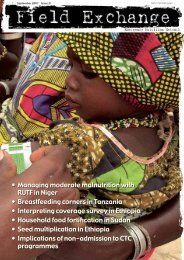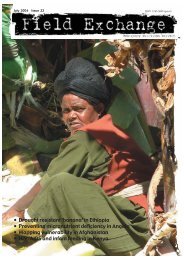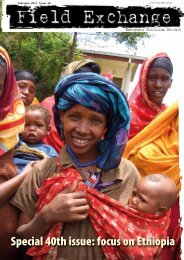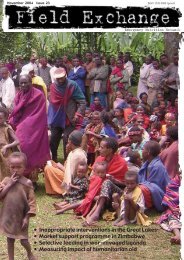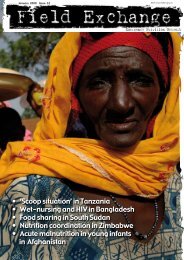Download a PDF of this issue - Field Exchange - Emergency ...
Download a PDF of this issue - Field Exchange - Emergency ...
Download a PDF of this issue - Field Exchange - Emergency ...
You also want an ePaper? Increase the reach of your titles
YUMPU automatically turns print PDFs into web optimized ePapers that Google loves.
Pr<strong>of</strong>essional pr<strong>of</strong>ile<br />
Dr Nadera<br />
Hayat Burhani<br />
By Carmel Dolan, ENN<br />
Dr Burhani, Afghanistan, 2012<br />
Dr Burhani speaking at International<br />
Day <strong>of</strong> the Midwife (2012)<br />
ENN interview with Dr. Nadera Hayat Burhani, Deputy Minister for<br />
Health Care Services Provision, Islamic Republic <strong>of</strong> Afghanistan<br />
In February 2012, I interviewed Dr Nadera<br />
Hayat Burhani, Deputy Minister for Health<br />
Care Services Provision, Ministry <strong>of</strong> Public<br />
Health (MoPH), Islamic Republic <strong>of</strong><br />
Afghanistan for <strong>Field</strong> <strong>Exchange</strong>. Dr Burhani<br />
was a guest speaker at the CMAM Conference<br />
held in Addis Ababa, Ethiopia in November<br />
2011 1 . It was at <strong>this</strong> event that I met Dr Burhani<br />
and agreed to a <strong>Field</strong> <strong>Exchange</strong> pr<strong>of</strong>ile on nutrition<br />
in Afghanistan and Dr Burhani’s<br />
experiences <strong>of</strong> working in such a complex environment.<br />
Dr. Burhani is a medical physician (obstetrics<br />
and gynaecology speciality) and holds a<br />
Masters in International Public Health. As<br />
Deputy Minister for Health Care Services<br />
Provision, she is responsible for overseeing all<br />
aspects <strong>of</strong> nutrition from prevention to treatment<br />
<strong>of</strong> malnutrition in emergency and<br />
development situations. Previous to her current<br />
appointment in September 2008, she was<br />
Deputy Minister for Reproductive Health and<br />
Maternal and Child Health for three and a half<br />
years, following a clinical career as a gynaecologist/obstetrician<br />
and physician in Balkh<br />
Province, Afghanistan.<br />
Q: How would you describe the current<br />
nutrition environment (policy, resources,<br />
coordination, visibility and programmes) in<br />
Afghanistan?<br />
The current policy environment is, Dr Burhani<br />
explained, responsive to the current needs and<br />
priorities <strong>of</strong> the country. The nutrition policy<br />
and strategy has been developed as part <strong>of</strong><br />
health and nutrition sector strategy, which falls<br />
under the Afghanistan National Development<br />
Strategy (ANDS). Based on <strong>this</strong> policy, different<br />
programmatic guidelines have been developed<br />
to facilitate implementation <strong>of</strong> the policy. For<br />
example, guidelines on the Management <strong>of</strong><br />
Acute Malnutrition, Infant and Young Child<br />
Feeding (IYCF) and Micronutrients have been<br />
developed recently 2 .<br />
She described how two national legislations<br />
have been developed and endorsed by the<br />
Cabinet, one in support <strong>of</strong> breastfeeding and for<br />
the control <strong>of</strong> marketing <strong>of</strong> breast milk substitutes<br />
and the other, for Universal Salt Iodisation<br />
(USI). According to these two national legislations,<br />
two national committees comprised <strong>of</strong><br />
representatives <strong>of</strong> different sectors have been<br />
established to oversee the implementation <strong>of</strong><br />
related programmes through a multi-sectoral<br />
approach. We have to, she emphasizes, work on<br />
the food safety and quality control policies and<br />
guidelines, as well as the dietary guidelines, for<br />
Afghans in the near future.<br />
In terms <strong>of</strong> financial resources, we are in a<br />
good position. The main donors <strong>of</strong> the MoPH<br />
are USAID, the World Bank, and the European<br />
Union (EU), who are financing the primary<br />
health care services and nutrition is a key<br />
component. Also, the Canadian International<br />
Development Agency (CIDA) has committed to<br />
three years funding to support implementation<br />
<strong>of</strong> nutrition activities through the primary<br />
health care system. UN partners are supporting<br />
the MoPH to manage emergency response.<br />
In terms <strong>of</strong> technical resources, we have a<br />
department at the MoPH with technical staff to<br />
support the implementation <strong>of</strong> nutrition<br />
programmes according to the national priorities<br />
and policies. This department plays an important<br />
role in the stewardship role <strong>of</strong> the MoPH to<br />
develop guidelines, policies, strategies, provide<br />
technical assistance for implementing partners,<br />
coordinate efforts with different stakeholders<br />
and sectors and monitor the current<br />
programmes. The MoPH is planning a long<br />
term strategy to develop more technical capacity<br />
in nutrition in the near future. Links have<br />
been established with the University <strong>of</strong><br />
Massachusetts (US) and the London School <strong>of</strong><br />
Hygiene and Tropical Medicine (UK) to provide<br />
opportunities for a team <strong>of</strong> Afghan pr<strong>of</strong>essionals<br />
to obtain a Master’s degree in nutrition.<br />
Discussion with the Kabul Medical University,<br />
Cheragh Medical University and the American<br />
University <strong>of</strong> Afghanistan is on-going to establish<br />
a pre-service education programmes on<br />
nutrition (bachelor degree).<br />
The key programmes in nutrition are USI,<br />
IYCF and the prevention <strong>of</strong> micronutrients deficiencies.<br />
These programmes are at different<br />
stages <strong>of</strong> development to reach national coverage.<br />
Our USI programme is a success story. It<br />
started in 2003 and we now have an average <strong>of</strong><br />
61% coverage <strong>of</strong> iodised salt utilisation at the<br />
national level with above 90% coverage in the<br />
main cities. For IYCF we have had pilot projects<br />
and based on lessons learnt, we are going to<br />
scale up the programme to reach each breastfeeding<br />
mother and her family in the country.<br />
Our micronutrients supplementation<br />
programme is mainly done through health<br />
system structures and here we need to work<br />
more to reduce iron, zinc, folic acid, vitamin C,<br />
and vitamin A deficiency.<br />
Coordination is a challenge, especially as<br />
there are several actors. Dr. Burhani observed<br />
that nutrition is a multi-sectoral activity and<br />
requires involvement <strong>of</strong> several actors from the<br />
government, UN, donor agencies and implementing<br />
partners. To coordinate efforts at<br />
different levels require serious steps. She<br />
described how they are going to address <strong>this</strong><br />
challenge through different approaches.<br />
‘Nutrition Partners’ is a committee comprised<br />
<strong>of</strong> the main donors, UN agencies and some<br />
technical agencies, where partners discuss<br />
programmatic <strong>issue</strong>s in terms <strong>of</strong> nutrition, especially<br />
developmental interventions. The<br />
Nutrition Cluster is another forum gathering<br />
UN agencies, NGOs and government partners<br />
to deal with emergency situations. Another<br />
two good examples she had already mentioned:<br />
the national committee for promotion <strong>of</strong> breast-<br />
1<br />
See footage <strong>of</strong> Dr Burhani’s presentations at www.cmam<br />
conference2011.org<br />
2<br />
Available at www.moph.gov.af<br />
98



